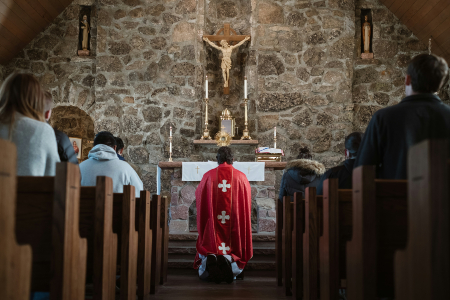We ask you, humbly: don't scroll away.
Hi readers, it seems you use Catholic Online a lot; that's great! It's a little awkward to ask, but we need your help. If you have already donated, we sincerely thank you. We're not salespeople, but we depend on donations averaging $14.76 and fewer than 1% of readers give. If you donate just $5.00, the price of your coffee, Catholic Online School could keep thriving. Thank you.Help Now >
Vatican Clarifies Catholic Doctrine on Eucharist for Divorced Couples Living in New Unions
FREE Catholic Classes
In a day marked by significant developments in the Catholic world, five cardinals issued a series of "dubia" to Pope Francis, and the Vatican has released the pope's responses. Simultaneously, another noteworthy set of "responsa" or responses to a leading prelate's request for clarification on a controversial moral doctrine was published by the Dicastery for the Doctrine of the Faith.

Kumer
Highlights
10/3/2023 (6 months ago)
Published in Marriage & Family
Keywords: Vatican, Eucharist, Divorced Couples, Amoris Laetitia, Catholic Doctrine, Moral Doctrine, Cardinal Dominik Duka, Pope Francis, Cardinal Victor Manuel Fernandez
The Vatican publicly disclosed responses to ten dubia submitted by Czech Cardinal Dominik Duka regarding "the administration of the Eucharist to divorced couples living in a new union." These queries, originally presented by the archbishop emeritus of Prague on July 13 on behalf of the Czech Bishops' Conference, were met with responses from the Dicastery for the Doctrine of the Faith (DDF), bearing the signatures of both Pope Francis and the new prefect, Cardinal Victor Manuel Fernandez. These responses were delivered to Cardinal Duka on September 25.
At the core of Cardinal Duka's dubia and the Vatican's response lies the practical application of Amoris Laetitia, "The Joy of Love," Pope Francis' apostolic exhortation issued following the 2015 Synod on the Family. Specifically, the focus is on its pastoral guidance for the reception of Communion by those sacramentally married but "divorced and remarried" to another person other than their spouse.
Cardinal Fernandez, the assumed author of the pope's 2015 exhortation and now the head of Pope Francis' doctrine office, provided authoritative answers to the questions posed by the Czech prelate. This marks a noticeable shift from the DDF's prior approach to questions concerning Amoris Laetitia, which included not responding to previously submitted dubia.
Regarding the question of allowing Catholic divorced individuals, civilly remarried to another, to receive the Eucharist, Fernandez stated that while priests should offer pastoral guidance, it is ultimately the individual's responsibility to examine their conscience, guided by the Church's principles. They should evaluate their readiness to receive the sacrament.
Fernandez emphasized the importance of forming one's conscience, with the support of a priest and the Church's guidelines, to assess the possibility of accessing the sacraments.
The guidance in Amoris Laetitia on this matter had caused controversy upon its release. In 2016, four cardinals, including American Cardinal Raymond Burke and German Cardinal Walter BrandmĂĽller, submitted five dubia asking Pope Francis to clarify the validity of St. John Paul II's teaching in Veritatis Splendor on absolute moral norms in the wake of Amoris Laetitia. Pope Francis did not respond to these questions.
Cardinal Fernandez now states that Amoris Laetitia, as a result of back-to-back synods on the family in 2014 and 2015, represents the collective work and prayer of the entire Church. He maintains that its guidance on Communion for the divorced and remarried is based on the teachings of Pope Francis' two predecessors, although Pope Francis acknowledges that practicing continence may be challenging in certain cases and, after discernment, allows for the administration of the sacrament of reconciliation.
 Hi readers, it seems you use Catholic Online a lot; that's great! It's a little awkward to ask, but we need your help. If you have already donated, we sincerely thank you. We're not salespeople, but we depend on donations averaging $14.76 and fewer than 1% of readers give. If you donate just $5.00, the price of your coffee, Catholic Online School could keep thriving. Thank you. Help Now >
Hi readers, it seems you use Catholic Online a lot; that's great! It's a little awkward to ask, but we need your help. If you have already donated, we sincerely thank you. We're not salespeople, but we depend on donations averaging $14.76 and fewer than 1% of readers give. If you donate just $5.00, the price of your coffee, Catholic Online School could keep thriving. Thank you. Help Now >
Furthermore, Amoris Laetitia "opens the possibility of accessing the sacraments of reconciliation and the Eucharist when, in a particular case, there are limitations that attenuate responsibility and culpability," although the process of accompaniment does not necessarily culminate in the sacraments but may lead to other forms of communion and inclusion.
Drawing directly from Amoris Laetitia, the DDF's response underscores that remarried divorcees should reflect on their behavior toward their children during the marital crisis, attempts at reconciliation, the partner's abandoned situation, the impact of the new relationship on the family and faithful community, and the example it sets for young people preparing for marriage. Such sincere reflection can strengthen trust in the mercy of God.
The responses also affirm that bishops should establish criteria in their dioceses based on Amoris Laetitia to guide priests in accompanying and discerning the situations of divorced individuals in new unions. Bishops of the Buenos Aires pastoral region's application of Amoris Laetitia, regarded by Pope Francis as "the only interpretation," should be considered authentic magisterium, with no other comprehensive explanation forthcoming.
The responses do not directly address whether acts in the sexual life of a couple, including at least one divorced and remarried Catholic, should be discussed in the sacrament of reconciliation. However, Cardinal Fernandez emphasizes that the couple's sexual life should be subject to an examination of conscience to ensure it reflects genuine love and promotes its growth.
In response to Cardinal Duka's inquiry about establishing internal unity among the Czech bishops on the issue of pastoral guidance for divorced and remarried individuals while respecting the Church's magisterium, Cardinal Fernandez suggests that the bishops' conference should agree on minimum criteria to implement Amoris Laetitia's proposals. This would assist priests in accompanying and discerning the possible access to the sacraments for those in new unions without undermining the legitimate authority of individual bishops in their dioceses.
Join the Movement
When you sign up below, you don't just join an email list - you're joining an entire movement for Free world class Catholic education.
-

-
Mysteries of the Rosary
-
St. Faustina Kowalska
-
Litany of the Blessed Virgin Mary
-
Saint of the Day for Wednesday, Oct 4th, 2023
-
Popular Saints
-
St. Francis of Assisi
-
Bible
-
Female / Women Saints
-
7 Morning Prayers you need to get your day started with God
-
Litany of the Blessed Virgin Mary
Pope Francis Advises Parish Priests on Fostering a Missionary Church
-

5 Reasons Going To Church Is Important (even on days you feel like you can skip)
-

U.S. Catholic Parishes Experience Resurgence of Traditional Practices
-
Pope Francis Urges Faith and Prayers for Peace
-
Florida Welcomes Volunteer Chaplains to Public Schools
Daily Catholic
 Daily Readings for Friday, May 03, 2024
Daily Readings for Friday, May 03, 2024 St. James the Lesser: Saint of the Day for Friday, May 03, 2024
St. James the Lesser: Saint of the Day for Friday, May 03, 2024 Prayer before Starting on a Journey: Prayer of the Day for Friday, May 03, 2024
Prayer before Starting on a Journey: Prayer of the Day for Friday, May 03, 2024- Daily Readings for Thursday, May 02, 2024
- St. Athanasius: Saint of the Day for Thursday, May 02, 2024
- The Our Father: Prayer of the Day for Thursday, May 02, 2024
![]()
Copyright 2024 Catholic Online. All materials contained on this site, whether written, audible or visual are the exclusive property of Catholic Online and are protected under U.S. and International copyright laws, © Copyright 2024 Catholic Online. Any unauthorized use, without prior written consent of Catholic Online is strictly forbidden and prohibited.
Catholic Online is a Project of Your Catholic Voice Foundation, a Not-for-Profit Corporation. Your Catholic Voice Foundation has been granted a recognition of tax exemption under Section 501(c)(3) of the Internal Revenue Code. Federal Tax Identification Number: 81-0596847. Your gift is tax-deductible as allowed by law.








 Daily Readings for Friday, May 03, 2024
Daily Readings for Friday, May 03, 2024 St. James the Lesser: Saint of the Day for Friday, May 03, 2024
St. James the Lesser: Saint of the Day for Friday, May 03, 2024 Prayer before Starting on a Journey: Prayer of the Day for Friday, May 03, 2024
Prayer before Starting on a Journey: Prayer of the Day for Friday, May 03, 2024

